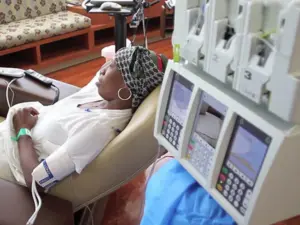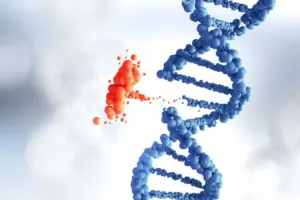Comprehensive Diagnosis and Treatment for Leukemia
Leukemia treatment at VS Hospitals offering advanced diagnostics, expert hemato oncologists, targeted therapies, and compassionate, comprehensive cancer care.

Leukemia
Leukemia is a type of cancer that affects the blood and bone marrow, leading to the production of abnormal white blood cells. These abnormal cells can interfere with the body’s ability to fight infections, control bleeding, and carry oxygen throughout the body. While leukemia can affect people of all ages, it is more common in older adults and children. Advances in medical science have made it possible to treat and manage leukemia effectively, especially when diagnosed early. This article explores the signs, symptoms, risk factors, diagnosis, and treatment options for leukemia, as well as the specialized services offered at VS Hospitals.

Early Detection Saves Lives
Early detection and treatment are crucial for improving the chances of survival. If you notice any concerning symptoms, consult a healthcare provider immediately.
Signs and Symptoms
Fatigue
Feeling unusually tired or weak, even after getting enough rest, is a common symptom of leukemia.
Frequent Infections
Since leukemia affects the immune system, people with this condition may experience frequent or severe infections.
Unexplained Weight Loss
Losing weight without trying can be a sign of leukemia, especially when combined with other symptoms.
Fever and Chills
Persistent fever or chills, especially without a clear cause, can indicate leukemia.
Easy Bruising or Bleeding
People with leukemia may bruise easily or experience prolonged bleeding from minor cuts or injuries.
Pain or Fullness in the Abdomen
Enlargement of the spleen or liver can cause pain or a feeling of fullness in the abdomen.
Swollen Lymph Nodes
Swollen lymph nodes in the neck, underarms, or groin may indicate leukemia, particularly in certain types.
Pale or Sallow Skin
Anemia caused by leukemia may lead to pale or sallow skin, indicating a lack of red blood cells.
Blood in Urine
Hematuria - pink, red, or dark urine, the most common symptom
Frequent Urination
Feeling the need to urinate frequently, even when bladder is not full
Painful Urination
Experiencing pain or burning sensation while urinating
Back or Pelvic Pain
Pain that occurs as the cancer grows and spreads
Unexplained Weight Loss
Significant weight loss not related to diet or exercise
Fatigue
Feeling unusually tired or weak without a clear cause
Meet Our Expert Leukemia Specialists
Risk Factors
Smoking
Smoking is one of the leading causes of bladder cancer. Chemicals in tobacco smoke can damage the lining of the bladder, increasing the risk.

Gender
Men are at a higher risk of developing bladder cancer than women.

Chronic Bladder Infections or Inflammation
Conditions such as bladder infections and long-term bladder inflammation can increase the risk.

Exposure to Chemicals
Prolonged exposure to certain chemicals, especially those used in the dye industry, rubber production, and chemical manufacturing, increases the risk.

Age
Leukemia is more common in older adults, although certain types of leukemia, such as acute lymphocytic leukemia (ALL), are more common in children.

Family History
A family history of leukemia or other blood cancers can increase the risk of developing leukemia.

Previous Cancer Treatment
People who have undergone certain chemotherapy or radiation treatments for other cancers are at higher risk of developing leukemia later in life.

Genetic Disorders
Certain inherited conditions, such as Down syndrome, increase the risk of developing leukemia.

Exposure to Chemicals
Long-term exposure to certain chemicals, including benzene and some pesticides, has been linked to an increased risk of leukemia.

Smoking
Smoking is a known risk factor for leukemia, particularly for certain types of the disease, like acute myelogenous leukemia (AML).

Weakened Immune System
Individuals with compromised immune systems, such as those with HIV/AIDS or those who have received organ transplants, are at an increased risk of leukemia.

Leukemia
Diet and Nutrition
Prevention
Diagnosis
Key Services
Key Facilities
While diet cannot directly prevent leukemia, it plays an essential role in maintaining overall health, supporting the immune system, and improving quality of life during and after leukemia treatment. Here are some dietary recommendations:
- Eat a Nutrient-Rich Diet: A balanced diet rich in fruits, vegetables, whole grains, and lean proteins helps support the body’s immune function and provides essential nutrients during treatment.
- Increase Antioxidants: Foods rich in antioxidants, such as berries, leafy greens, and citrus fruits, can help protect the body’s cells from damage and support immune health.
- Stay Hydrated: Drinking plenty of water and staying hydrated is important, especially for leukemia patients undergoing chemotherapy, which can cause dehydration and mouth sores.
- Lean Proteins: Including lean proteins such as chicken, fish, and plant-based sources like beans and legumes can support muscle mass and overall health.
- Limit Processed Foods and Sugar: Processed foods and sugar can weaken the immune system and contribute to inflammation. Focus on whole, unprocessed foods whenever possible.
- Iron-Rich Foods: Iron-rich foods, such as spinach, lentils, and fortified cereals, can help combat anemia, which is common in people with leukemia.
- Vitamin-Rich Foods: Include foods that are high in vitamins A, C, and E, as these vitamins support immune function and cell health. Examples include sweet potatoes, oranges, and nuts.
Maintaining a healthy, balanced diet is important for people living with leukemia, especially during treatment. It helps manage side effects and improve recovery outcomes.
Although there is no definitive way to prevent leukemia, several lifestyle changes and health practices can reduce the risk of developing the disease:
- Quit Smoking: Smoking is a major risk factor for leukemia. Quitting smoking significantly lowers the risk of developing leukemia and other cancers.
- Avoid Chemical Exposure: Minimize exposure to harmful chemicals, such as benzene and pesticides, which are linked to an increased risk of leukemia. Wearing protective gear in high-risk environments is essential.
- Maintain a Healthy Weight: Obesity has been linked to an increased risk of leukemia. Maintaining a healthy weight through diet and exercise can help reduce this risk.
- Limit Radiation Exposure: Limiting exposure to radiation, including unnecessary X-rays and CT scans, can help lower the risk of leukemia.
- Get Regular Check-ups: Regular check-ups with a healthcare provider can help identify potential health issues early. People at higher risk may need more frequent screenings.
- Vaccination: Vaccines, such as the flu vaccine, can help reduce the risk of infections that can lead to complications in people with leukemia.
Although prevention is not always possible, these steps can help reduce the risk and promote overall health.
The diagnosis of leukemia typically involves a combination of tests to confirm the presence of the disease and determine its type and stage. Common diagnostic procedures include:
- Blood Tests: A complete blood count (CBC) can detect abnormalities in the number and type of blood cells, which may indicate leukemia.
- Bone Marrow Biopsy: A bone marrow biopsy is used to confirm the diagnosis of leukemia. A sample of bone marrow is extracted from the hip bone and examined under a microscope.
- Cytogenetic Testing: This test analyzes the chromosomes of leukemia cells to identify genetic abnormalities that can help classify the leukemia and guide treatment.
- Flow Cytometry: This test helps to identify the specific type of leukemia by analyzing the surface markers of blood or bone marrow cells.
- Imaging Tests: Imaging tests such as X-rays, CT scans, and MRIs can help determine if the leukemia has spread to other parts of the body.
Early diagnosis of leukemia is crucial for effective treatment. Once diagnosed, a personalized treatment plan is created based on the specific type and stage of leukemia.
VS Hospitals offers a comprehensive range of services for the diagnosis, treatment, and management of leukemia. These include:
- Comprehensive Cancer Care: A multidisciplinary team of oncologists, hematologists, and support staff work together to provide personalized care for leukemia patients.
- Chemotherapy: VS Hospitals provides chemotherapy treatment using the latest protocols and medications to target leukemia cells.
- Bone Marrow Transplant: For certain types of leukemia, a bone marrow transplant may be necessary. VS Hospitals offers stem cell and bone marrow transplant services.
- Immunotherapy: Immunotherapy treatments are available to help the immune system fight leukemia cells.
- Palliative Care: For patients with advanced leukemia, palliative care is offered to manage symptoms and improve quality of life.
- Supportive Care Services: VS Hospitals offers nutritional counseling, physiotherapy, and psychological support to help leukemia patients cope with treatment side effects and improve recovery outcomes.
VS Hospitals is equipped with world-class facilities to ensure that leukemia patients receive the best possible care. These include:
- Advanced Diagnostic Equipment: VS Hospitals uses the latest diagnostic tools, including flow cytometry, bone marrow biopsy equipment, and imaging technology to ensure accurate diagnosis.
- Oncology Department: The oncology department is staffed with experienced specialists who focus on the diagnosis, treatment, and management of leukemia.
- Chemotherapy Units: Dedicated chemotherapy units provide a comfortable and safe environment for patients undergoing chemotherapy treatment.
- Bone Marrow Transplant Unit: The hospital has specialized units for stem cell and bone marrow transplants, providing high-quality care and support for transplant patients.
- Rehabilitation Services: Post-treatment rehabilitation, including physiotherapy and counseling, is available to support leukemia patients in their recovery process.
Top Medical Facilities at Our Multispeciality Hospital – Here’s What Makes Us Different!
Ready to Begin Your Leukemia Care Journey?
Learn More About Leukemia Care
Frequently Asked Questions
Common symptoms of leukemia include fatigue, frequent infections, unexplained weight loss, fever, easy bruising, and swollen lymph nodes. If these symptoms persist, it’s essential to consult a doctor for further evaluation and diagnosis.
At VS Hospitals, leukemia treatment includes chemotherapy, immunotherapy, stem cell or bone marrow transplants, and palliative care. A personalized treatment plan is developed by a team of specialists based on the type and stage of leukemia.
While leukemia cannot always be prevented, reducing risk factors like quitting smoking, avoiding harmful chemicals, maintaining a healthy weight, and regular medical check-ups can lower the risk of developing leukemia.
